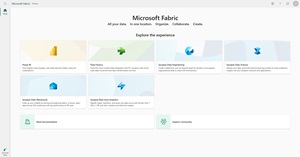Building ETL Workflows in Microsoft Fabric, Step-by-Step
Microsoft Fabric was described as "the AI-fication of Microsoft's data business" by RedmondMag writer Joey D'Antoni when it was unveiled at the company's Build 2023 developer conference.
He listed these highlights of the new offering:
- Microsoft's Fabric is a comprehensive data analytics platform that integrates various data tools into a single SaaS offering, aiming to eliminate data silos and promote data sharing within organizations.
- Fabric leverages the concept of data fabric, combining modern trends like data lakes, the delta store, and parquet file formats, presented through a set of standard APIs.
- Fabric incorporates AI capabilities, including Power BI Copilot for DAX language and natural language query functionality. It also introduces Data Activator, a service that monitors data changes and triggers actions, resembling Logic Apps or Power Automate.
"Fabric is a big, bold step from Microsoft," D'Antoni said. "Competitors like Snowflake and partners like Databricks have been making inroads into a traditionally strong business intelligence and analytics market for Microsoft. While Fabric will remain a work in progress for some time, the level of investment and direction from the company in data analytics is promising."
 [Click on image for larger view.] Microsoft Fabric (source: Microsoft).
[Click on image for larger view.] Microsoft Fabric (source: Microsoft).
That's a lot of functionality to take in via an article or two, so a hands-on, interactive, step-by-step presentation demonstration on creating Extract, Transform, Load (ETL) pipelines using Fabric might help Microsoft-centric developers get a better handle on the technology.
Luckily, Microsoft's Sally Dabbah is going to helm just such a presentation -- titled "Step-by-Step Guide: Building ETL Workflows in Microsoft Fabric" -- at the March Visual Studio Live! developer conference in Las Vegas.
"This hands-on session will empower attendees to gain a deep understanding of the ETL process, equipping them with practical skills to efficiently manage and transform their organizational data," said Dabbah, who established herself as a significant voice in Azure Cloud Analytics Services by posting regularly on Microsoft's Tech Community blog.
"By attending this session, participants will discover how to harness the power of Microsoft Fabric for seamless data integration, ensuring they can extract valuable insights from their data," she continued.
Attendees are promised to learn:
- Master ETL Workflow Creation: By the end of the session, attendees will be proficient in building ETL workflows from scratch, understanding the essential steps involved in data extraction, transformation, and loading
- Gain In-Depth Fabric Knowledge: Participants will acquire a thorough understanding of Microsoft Fabric, enabling them to leverage its features and capabilities for data integration and management effectively and to know better fabric concepts such as: OneLake,OneCopy, OneSecurity and so on.
- Enhance Data Insight Capabilities: This session will equip attendees with the skills needed to unlock valuable insights from their data, ultimately leading to more informed decision-making and improved organizational performance"
We recently caught up with Dabbah to learn more about her 75-minute, introductory-level presentation in a short Q&A.
VSLive! What inspired you to present a session on building ETL Workflows in Microsoft Fabric?
Dabbah: My inspiration came from recognizing the growing need for efficient data handling in today's data-driven world. As organizations increasingly rely on large and complex datasets, the ability to effectively extract, transform and load data becomes crucial. Microsoft Fabric, with its robust capabilities, offers an innovative solution. This session aims to demystify the process and empower professionals to harness these tools effectively.
For those unfamiliar, could you briefly explain what ETL (Extract, Transform, Load) workflows are, and why Microsoft Fabric is a significant tool in this context?
ETL workflows are processes used to extract data from various sources, transform it into a structured format and load it into a target system for analysis and reporting.
 "Microsoft Fabric stands out in this context due to its scalability, integration options and advanced features, making it an ideal platform for managing complex data integration tasks."
"Microsoft Fabric stands out in this context due to its scalability, integration options and advanced features, making it an ideal platform for managing complex data integration tasks."
Sally Dabbah, Data Engineer, Azure Cloud Analytics Services, Microsoft
Microsoft Fabric stands out in this context due to its scalability, integration options and advanced features, making it an ideal platform for managing complex data integration tasks.
Your session promises a comprehensive, step-by-step demonstration. Can you give us an overview of what this hands-on approach will look like and how it will benefit attendees, especially those new to ETL workflows?
The session will be structured as a practical, step-by-step guide. Attendees will be walked through the creation of an ETL workflow, starting from data extraction to final loading. This approach will be particularly beneficial for those new to ETL, providing them with a solid foundation and practical skills that can be immediately applied.
Microsoft Fabric offers various features for data integration. Could you highlight some key features or tools within Fabric that are particularly beneficial for building ETL workflows?
Microsoft Fabric offers several features that make it stand out for ETL workflows, such as high scalability, robust data processing capabilities and advanced data integration tools. I will highlight features like real-time data processing and customizable workflow options that cater to various business needs.
You mention that attendees will learn about advanced Fabric concepts like OneLake, OneCopy, OneSecurity and so on. Can you elaborate on how understanding these concepts will enhance their ETL workflow creation?
OneLake, OneCopy, OneSecurity: These advanced concepts represent the cutting-edge aspects of Microsoft Fabric. Understanding OneLake, OneCopy and OneSecurity enables users to manage data more securely, efficiently and in a unified manner. This knowledge enhances the ability to create more sophisticated and secure ETL workflows.
How will mastering ETL workflows in Microsoft Fabric enable attendees to unlock valuable insights from their data, and how can this lead to improved decision-making and organizational performance?
Proficiency in ETL workflows using Microsoft Fabric allows professionals to unlock deep insights from their data, leading to more informed decision-making and improved organizational performance. It equips them with the tools to handle complex data scenarios, thereby enhancing their data analytics capabilities.
Looking ahead, what are some emerging trends or advancements in ETL workflows and data integration that professionals should be aware of, and how does Microsoft Fabric fit into this evolving landscape?
The field of ETL and data integration is rapidly evolving, with trends like real-time data processing, cloud-based integration, and AI-driven analytics becoming more prevalent. Microsoft Fabric is well-positioned in this landscape, offering a platform that adapts to these emerging trends while continuing to provide robust and scalable solutions for ETL workflows.
Note: Those wishing to attend the conference can save hundreds of dollars by registering early, according to the event's pricing page. "Register for VSLive! Las Vegas by the Super Early Bird Deadline (Jan. 16) to save up to $400 and secure your seat for intensive developer training in exciting Las Vegas!" said the organizer of the developer conference.
Posted by David Ramel on 01/15/2024